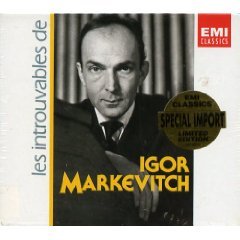| All Artists: J.S. Bach, Haydn/Schubert/Rossini/Mendelssohn, Tchaikovsky/Richard Strauss/Shostakovich Title: Les Introuvables d'Igor Markevitch Members Wishing: 0 Total Copies: 0 Label: EMI/Angel/Virgin/Imports Release Date: 11/26/1996 Genre: Classical Styles: Chamber Music, Forms & Genres, Theatrical, Incidental & Program Music, Historical Periods, Baroque (c.1600-1750), Classical (c.1770-1830), Modern, 20th, & 21st Century, Symphonies Number of Discs: 4 SwapaCD Credits: 4 UPC: 724356921221 |
Search - J.S. Bach, Haydn/Schubert/Rossini/Mendelssohn, Tchaikovsky/Richard Strauss/Shostakovich :: Les Introuvables d'Igor Markevitch
 | J.S. Bach, Haydn/Schubert/Rossini/Mendelssohn, Tchaikovsky/Richard Strauss/Shostakovich Les Introuvables d'Igor Markevitch Genre: Classical |
Larger Image |
CD DetailsSimilar CDs
|
CD ReviewsOOP, but far superior to DG's Markevitch box set Santa Fe Listener | Santa Fe, NM USA | 03/14/2006 (5 out of 5 stars) "EMI had its Frnech "Introuvables" box set out a decade before DG decided to reissue historic Markevitch performances in its "Original Masters" series last year. Now the superior EMI set is out of print and must be sought on the used market. Like Hermann Scherchen, Igor Markevitch was an original, and at his best nobody conducted with quite his intensity or peculiar imagination--he was fundamentally a modernist, both as composer and conductor, with a post-romantic sensibility. All 4 CDs are with the same orchestra, the excellent French National Radio Orchestra, between 1955-57--a very short period but at the height of Markevitch's career. The sonics, all in mono, tend to be quite decent, without the upper register shrillness common to many of the recordings in the 9-CD set from DG. Their only flaw is that sometimes the microphones were placed too far back. The works that most appealed to me are Richard Strauss--Le Bourgeois Gentilhomme Suite--this is given a very bright, effervescent performance, one of the best on disc. Haydn- Sym. 101 & 102: Because they are barely tinged with romanticism, Haydn's symphonies come off well in dry, crisp French readings. Here Markevitch takes the opportunity to show off how effervescent and joyous Haydn should be. These are great performances. Schubert Unfinished Sym.: Schubert from Paris sounds a bit dubious, but Markevitch gives the Unfinished an easy, affectionate reading on a rather reduced scale. Rossini overtures: There are six here, the usual bunch, and they are done with wit and sparkle. Anyone who is a master at Haydn can't help but excel in Rossini, and Markevitch does. Quicksilver as he is, he still manages to sound affetionate in this music. Mendelssohn 'Italian' Sym.: Guido Cantelli made a famous recording of this work at about the same time with the Philharmonia in London, and although this recording is too distant, and the French orchestra not nearly as disciplined as their English counterparts, Markevitch gives us a vivacious reading that equals the more renowned one. I would say it has higher spirits and more genuine humor than Cantelli's. Tchaikovsky Sym. #4: Markevitch was renowned for his Tchaikovsky, but I was fairly disappointed in this reading, which comes in lackluster, cramped sound and isn't played with great dash or heroism. Even so, it has many merits along the way. Shostakovich Sym. #1: Markevitch takes a light, bright approach to this mercurial work and makes a total success of it. We don't get much color from the mono recording, but other than that, this is a thoroughly engaging performance, free of preboding. It's overshadowed, though, by half a dozen recordings in the stereo era. " Review from The Independent Record Collector | Mons, Belgium | 09/14/2005 (5 out of 5 stars) "There can be no question that these attentive and often highly original performances are products of a fertile musical mind. As it happens, Igor Markevitch's own creative talents (a small but significant oeuvre still awaits due recognition) enrich this particular miscellany with an ingenious orchestration of Bach's Musical Offering. Bach a la Markevitch is full-bodied in the two Ricercare, dynamic in the canons and cunningly supportive of the leading lines in the Sonata a 3. Tchaikovsky's Fourth Symphony--mono precursor of the more familiar stereo LSO recording for Philips--features a plethora of dynamic adjustments and tempo changes, most of them effective, whereas Strauss's Le Bourgeois Gentilhomme is perky and outspoken. There's a Haydn Clock Symphony that moves briskly in the Andante and a stylish Symphony No 102. Schubert's Unfinished is dramatic, the Rossini overtures have great character, and Shostakovich's F minor Symphony--a fine and famous performance--is very much on line with the novel, precocious, and revolutionary statements that Markevitch himself penned during the 1930s and 1940s. The rugged demeanour of these recordings suggests a largely unchecked (though not unwarranted) interpretative enthusiasm."
|



